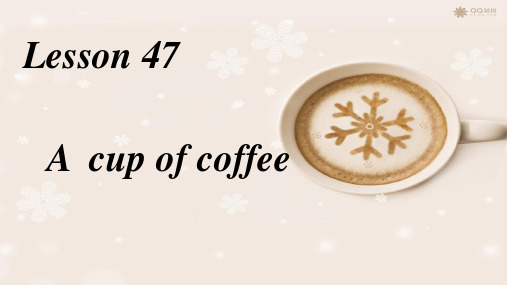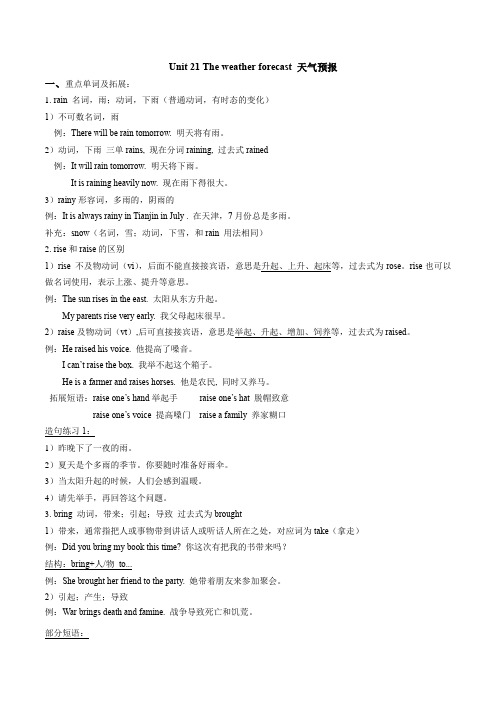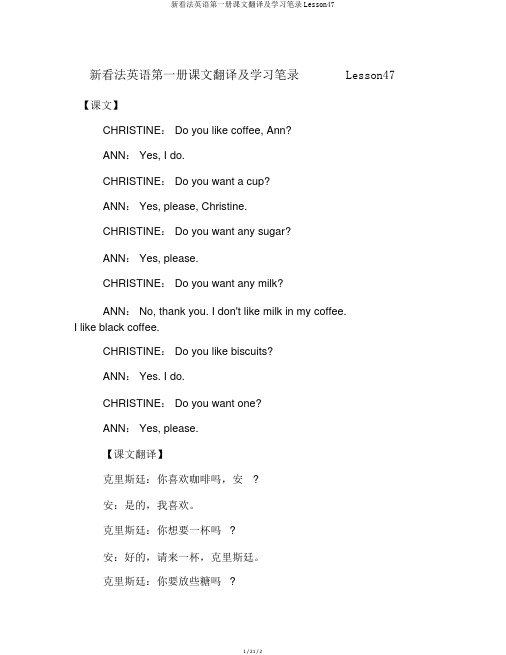《新概念英语》青少版第一册第47课:The weather forecast
新概念英语第一册47-48课件(共张PPT)

14、意志坚强的人能把世界放在手中 像泥块 一样任 意揉捏 。2021 年8月5 日星期 四2021/8/52021 /8/5202 1/8/5
•
15、最具挑战性的挑战莫过于提升自 我。。2 021年8 月2021 /8/5202 1/8/520 21/8/58 /5/2。2 021/8/5 2021/8/5Augu st 5, 2021
Welcome to my class !
When in Rome, do as the Romans do. 入鄉隨俗。
There is kindness to be found everywhere. 人間處處有溫情。
Revise: a cup/bottle/piece/loaf/bar/pound/… of…
构成
一般现在时常用be动词、行为动词的原形(第三人稱單 數加(e)s)。
謂語動詞為行为动词時,疑問句要借助do和does(三單) 引導, 否定句要借助於don’t和doesn’t (三單)引導。
肯定句
否定句
I like coffee. I don’t like coffee.
She likes coffee. She doesn’t like coffee.
Practice: The Simple Present Tense
What are these? They are oranges. What color are they? They are green.
What are these? They are oranges, too. What color are they? They are orange.
Question: How does Ann like her coffee?
新概念英语第一册第47-48课-A cup of coffee

新概念英语第一册第47-48课:A cup of coffee(实用版)编制人:__________________审核人:__________________审批人:__________________编制单位:__________________编制时间:____年____月____日序言下载提示:该文档是本店铺精心编制而成的,希望大家下载后,能够帮助大家解决实际问题。
文档下载后可定制修改,请根据实际需要进行调整和使用,谢谢!并且,本店铺为大家提供各种类型的实用范文,如学习资料、英语资料、学生作文、教学资源、求职资料、创业资料、工作范文、条据文书、合同协议、其他范文等等,想了解不同范文格式和写法,敬请关注!Download tips: This document is carefully compiled by this editor.I hope that after you download it, it can help you solve practical problems. The document can be customized and modified after downloading, please adjust and use it according to actual needs, thank you!In addition, this shop provides various types of practical sample essays, such as learning materials, English materials, student essays, teaching resources, job search materials, entrepreneurial materials, work examples, documents, contracts, agreements, other essays, etc. Please pay attention to the different formats and writing methods of the model essay!新概念英语第一册第47-48课:A cup of coffeeLesson 47 A cup of coffee一杯咖啡Listen to the tape then answer this question. How does Ann like her coffee?听录音,然后回答问题。
新概念英语第一册课件47-50课

精品教学件| Excellent teaching plan新概念第一册必备词汇 1 butcher ['but??] n. 卖肉的Lesson 47 2 meat[mi:t] n.(食用)肉1 like [laik] v.喜欢,想要 3 beef [bi:f] n.牛肉2 want [w ?nt, w ɑ:nt] v. 想 4 lamb[l?m]n. 羔羊肉5 husband['h?zb?nd] n.丈夫Lesson 48 6 steak[steik] n.牛排1 fresh [fre?] a.新鲜的7 mince[mins] n.肉馅,绞肉2 egg [eg] n.鸡蛋8 chicken['t?ikin] n.鸡3 butter['b?t ?] n.黄油9 tell [tel] v.告诉4 pure [pju?] a.纯净的10 truth[tru:θ] n. 实情5 honey['h?ni] n.蜂蜜11 either['aie?] ad. 也 ( 用于否定句 )6 ripe [raip] a.成熟的7 banana [b?'n ɑ:n?] n. 香蕉Lesson 508 jam [d??m] n. 果酱 1 tomato[t?'m ɑ:t?u] n.西红柿9 sweet[swi:t] a.甜的 2 potato[p?'teit?u] n.土豆10 orange ['?rind ?] n. 橙 3 cabbage['k?bid?] n.卷心菜11 Scotch whisky苏格兰威士忌 4 lettuce['letis] n.莴苣12 choice [t??is] a.上等的,精选的 5 pea [pi:] n.豌豆13 apple['?p ?l] n.苹果 6 bean[bi:n] n.豆角14 wine[wain] n.酒,果酒7 pear[pe?] n.梨15 beer[bi?] n.啤酒8 grape[greip] n.葡萄16 blackboard['bl?kb ?:d] n. 黑板9 peach[pi:t?] n.桃Lesson 49新概念第一册讲义第47-48课新概念第一册47-48 文解及答案文注Further notes on the text1. Yes, I do.是的,我喜。
《新概念英语》学什么:第1册第47-48课

《新概念英语》学什么:第1册第47-48课《新概念英语》学什么:第1册第45-46课一、重要句型或语法1、一般现在时1)表示兴趣或爱好2)第一人称作主语3)第二人称作主语2、like 与want 的区别 1)like 表示长久的爱好 ,如:I like apples. 该句说明“我”一直喜欢苹果。
2)want 表示一时的喜好,如:I want an apple. 该句说明“我”现在想要苹果。
二、课文主要语言点Do you like coffee, Ann? 该句可以从恢复其肯定句来讲,即:I likecoffee.课文里的这个问句,其实就是这个句子的一般疑问句形式。
同时进行肯定句、否定句、一般疑问句、划线部分提问的句型转换操练。
注意区分like 与下文中的want 。
Do you want a cup? 可以重复“Do you like coffee, Ann?”的教学方法。
注意此处的 a cup 后面其实省略了of coffee 。
Yes, please, Christine. “Yes, please.”是用在对别人提出帮忙或是给出offer 之后的肯定回复。
注意提醒学生Christine 的发音。
Do you want any sugar注意句中的any 与some 的区别。
No, thank you. 该句与前文中的“Yes,please.”刚好相反,是用来对别人提出帮忙或是给出offer 之后的否定回复。
I don't like milk in my coffee. 虽然前面Christine 用的是want 来提问,但Ann却用like 来回答。
这是因为Christine 问的是此刻Ann 要不要在咖啡里加牛奶,而Ann 告诉Christine 的是她一贯的喜好,即不喜欢咖啡里加牛奶。
I likeblack coffee. 可介绍black coffee (清咖,不加牛奶的咖啡)与white coffee (白咖,加牛奶的咖啡)的区别。
新概念英语第一册 lesson47

英语是一门语言,英语的学习应回归语言 的本质。声音、聆听声音和表达声音,在学 习英语中具有本原的重要性。作为一名教师, 一定要引导学生不要把中文学习特有的传统 模式,套用在英语学习上。聆听是语言能力 的“童子功”,它令我们毫无困难的听懂他 人的表达,从而奠定口语表达的基础,奠定 语言自学能力的基础。因此,合理的英语学 习的模式必定是聆听先行,必然从聆听开始 突破,必须将聆听贯穿始终。
听配音反复配音听说课流程1边看图边听描述2听录音看视频整体感知3听录音理解文章4听录音画出生词及难点5小组合作教师点拨解决生词及难点6听录音跟读7小组读8分角色表演或朗读
在幸福中成长
在创新中发展
自主学习, 聆听优先, 聆听主导
学习英语主要是培养学生听、说、读、 写四个方面的技能,而听是第一技能。语 言学家认为,听力理解在语言学习中是一 项根本而重要的技能。最为一种能力,听 懂别人所说的英语是学生、特别是中小学 生学习英语的重要目的之一。作为学习英 语学习的手段,它又是学好英语的必由之 路。
新概念英语教材中,每2课课文作为一 个教学单元。每个单元的前半部分是一篇 按句型结构编排的情景对话或描述性文字, 它用来训练学生的理解能力,以及学生听、 说、读的能力,我通常把它称为听说课。 每个单元的后半部分通常有几组有编号的 插图,用于理解和口语练习,口头练习之 后有一小段笔头练习,用来巩固已经学到 的技能,我把它称为读写课。
Listen and underline.
Listen and repeat.
Read in groups.
Role-play the conversation
ripe bananas
Do you like…? Yes, I do. \ No, I don't. Do you want one \ any? Yes, please. \ No, thank you.
_新概念英语第一册47-48课课文详解、翻译及语法

A cup of coffee一杯咖啡Listen to the tape then answer this question. How does Ann like her coffee? 听录音,然后回答问题。
安想要什么样的咖啡?CHRISTINE: Do you like coffee, Ann?ANN: Yes, I do.CHRISTINE: Do you want a cup?ANN: Yes, please, Christine.CHRISTINE: Do you want any sugar?ANN: Yes, please.CHRISTINE: Do you want any milk?ANN: No, thank you.I don't like milk in my coffee.I like black coffee.CHRISTINE: Do you like biscuits?ANN: Yes. I do.CHRISTINE: Do you want one?ANN: Yes, please.New Word and expressions 生词和短语likev. 喜欢,想要wantv. 想参考译文克里斯廷:你喜欢咖啡吗,安?安:是的,我喜欢。
克里斯廷:你想要一杯吗?安:好的,请来一杯,克里斯廷。
克里斯廷:你要放些糖吗?安:好的,请放一些。
克里斯廷:要放些牛奶吗?安:不了,谢谢。
我不喜欢咖啡中放牛奶,我喜欢咖啡。
克里斯廷:你喜欢饼干吗?安:是的,我喜欢。
克里斯廷:你想要一块吗?安:好的,请来一块。
新概念第一册47-48 课文详解及练习答案课文详注Further notes on the text1.Yes, I do. 是的,我喜欢。
是一句肯定的简略回答。
如果是否定的回答,则应为No, I don't. I like…和I don't like…这两个句型是分别表示“我喜欢/想要……”和“我不喜欢/想要……”的惯常用法。
青少版新概念2BUnit21 The weather forecast教程文件

The weather will change in the next few days.
[wind]
n.风
wind
[bləu] blow v.吹
She’s blowing the dandelion.
south west [ˌsauθˈwest]
n.西南
north
Picture 2
Weather forecaster:
Thanks John, and good morning! Last month was unusually cold and dry. But all that will change in the next few days.
Picture 3
gradually [ˈgrædjʊəlɪ]
adv.逐渐地
Rain will come in gradually from the south west this evening.
今天晚上,雨将会从西南方逐渐来临。
雨逐渐地大起来了。
The rain is gradually heavy.
rain shower
Weather forecaster:
From today, the wind will blow from the south west. It will bring in warm air from the Atlantic. And we'll have some rain.
Picture 4
LESSON 42
Pronunciation 语音
Weak forms: prepositions.
英语中的介词常弱读,特别是最常见的介 词of, for , from和at。 当它们弱读时,或在 短语的开头或者中间时,元音通常(但非 一定)弱读为短元音 /ə/。
新概念英语第一册Lesson47

二.句型转换 1. I like black coffee. (对划线提问)
What do you like? 2. I like milk in my coffee. (变为否定句)
I don't like milk in my coffee. 3.Do you want any wine?(肯定回答)
3. 背诵47课课文
下次课:周五2:50
Lesson 47 A cup of coffee
我喜欢精选的苹果。 肯定句 :I like choice apples. 否定句 :I don't like choice apples. 一般疑 :Do you like choice apples? 肯定回答:Yes,I do.
我想要一些纯蜂蜜。 肯定句 :I want some pure honey. 否定句 :I don't want any pure honey. 一般疑 :Do you want any pure honey? 否定回答:No,thank you.
• Wang Yida likes playing football.
• 3.want
想要
• want sth. 想要某物
• want to do (动词不定式)sth. 想要做某事
• Meng Hangrui wants to watch TV.
• Language points • 我喜欢清咖啡。
Yes, please.
• Words and Expressions
• 1.black coffee 清咖啡
• white coffee 加牛奶的咖啡
• 2.like
喜欢
•
可数名词复数(表示这一类别)
新概念英语第一册47-48课PPT课件

• Do you like coffee, Ann? • 此句中do做助动词用,无实际词义。
.
32
• ★助动词do的学习: • 特征: • 英语中的特殊语法现象。 • 协助动词进行使用。 • 本身无词义。
27
课文讲解
• Do you like coffee, Ann?
• Do you want a cup?
• Do you want any sugar?
• Do you want any milk?
• Do you like biscuits?
• Do you want one?
• 请仔细观察这些句子,有何共同特
• Miss Lu is a good teacher, we like her.
• ② v. 想要;希望有
• Do you like some apples? some表示请求
• 你想要点咖啡吗?
建议,希望别人 接受的时候用
• Would you like some coffee?eg,Would you
ANN:
Yes, please, Christine.
CHRISTINE: Do you want any sugar?
ANN:
Yes, please.
CHRISTINE: Do you want any milk?
ANN:
No, thank you.
I don't like milk in my coffee.
New Concept English(Book 1) (新概念英语)(第一册)
Unit21Theweatherforecast.知识点(讲义)新概念英语青少版2B

Unit 21 The weather forecast 天气预报一、重点单词及拓展:1.rain 名词,雨;动词,下雨(普通动词,有时态的变化)1)不可数名词,雨例:There will be rain tomorrow. 明天将有雨。
2)动词,下雨三单rains, 现在分词raining, 过去式rained例:It will rain tomorrow. 明天将下雨。
It is raining heavily now. 现在雨下得很大。
3)rainy形容词,多雨的,阴雨的例:It is always rainy in Tianjin in July . 在天津,7月份总是多雨。
补充:snow(名词,雪;动词,下雪,和rain 用法相同)2.rise和raise的区别1)rise 不及物动词(vi),后面不能直接接宾语,意思是升起、上升、起床等,过去式为rose。
rise也可以做名词使用,表示上涨、提升等意思。
例:The sun rises in the east. 太阳从东方升起。
My parents rise very early. 我父母起床很早。
2)raise及物动词(vt),后可直接接宾语,意思是举起、升起、增加、饲养等,过去式为raised。
例:He raised his voice. 他提高了嗓音。
I can’t raise the box. 我举不起这个箱子。
He is a farmer and raises horses. 他是农民, 同时又养马。
拓展短语:raise one’s hand举起手raise one’s hat 脱帽致意raise one’s voice 提高嗓门raise a family 养家糊口造句练习1:1)昨晚下了一夜的雨。
2)夏天是个多雨的季节。
你要随时准备好雨伞。
3)当太阳升起的时候,人们会感到温暖。
4)请先举手,再回答这个问题。
3.bring 动词,带来;引起;导致过去式为brought1)带来,通常指把人或事物带到讲话人或听话人所在之处,对应词为take(拿走)例:Did you bring my book this time? 你这次有把我的书带来吗?结构:bring+人/物to...例:She brought her friend to the party. 她带着朋友来参加聚会。
青少版新概念英语2B Unit 21 The weather forecast(27页)

There won’t be only one country. 一般疑问句:把will提到there之前。
Will there be only one country? Yes, there will. / No, there won’t.
预报 预报员 播音员 吹 空气
New words and expressions:
gradually rise fall outlook Celsius degree
逐渐地 上升 下降 展望 摄氏的 度数
预报
逐渐地
播音员
上升
下降
展望
度数
摄氏的
On Monday temperatures will rise to 22 degrees Celsius in the afternoon. In the evening temperatures will fall to 10 degrees Celsius.
我们今天下午没有空。
We won`t be free this afternoon. 她不会听我的. She will not listen to me.
当天气变冷的时候,鸟类不会飞去南边
•The birds won`t fly away to the south when the weather turns cold..
我想下个夏天北京的天气将会非常热。
•I think it will be very hot in Beijing next summer.
他将会使用他的笔
•He will use his pen
将会有大雨和大风天气。 Will there be heavy rain and strong winds?
新概念英语第一册Lesson47~52课后答案

新概念英语第一册Lesson47~52课后答案新概念英语第一册Lesson47~48课后答案A1 The aeroplane is flying over the village.2 The ship is going under the bridge.3 The children are swimming across the river.4 Two cats are running along the wall.5 The boy is jumping off the branch.6 The girl is sitting between her mother and her father.7 The teacher is standing in front of the blackboard.8 The blackboard is behind the teacher.B1 Do you like honey?Yes, I do. I like honey, but I don’t want any.2 Do you like bananas?Yes, I do. I like bananas, but I don’t want one.3 Do you like jam?Yes, I do. I like jam, but I don’t want any.4 Do you like oranges?Yes, I do. I like oranges, but I don’t want one.5 Do you like ice cream?Yes, I do. I like ice cream, but I don’t want any.6 Do you like whisky?Yes, I do. I like whisky, but I don’t want any.7 Do you like apples?Yes, I do. I like apples, but I don’t want one.8 Do you like wine?Yes, I do. I like wine, but I don’t want any.9 Do you like biscuits?Yes, I do. I like biscuits, but I don’t want one.10 Do you like beer?Yes, I do. I like beer, but I don’t want any.新概念英语第一册Lesson49~50课后答案A1 He likes coffee, but I don’t.2 She likes tea, but he doesn’t.3 He is eating some bread, but she isn’t.4 She can type very well, but he can’t.5 They are working hard, but we aren’t.6 He is reading a magazine, but I am not.B1 Does Sam like cabbage?Yes, he does. He likes cabbage, but he doesn’t want any.2 Does Sam like lettuce?Yes, he does. He likes lettuce, but he doesn’t want any.3 Do you like peas?Yes, I do. I like peas, but I don’t want any.4 Does Mrs. White like beans?Yes, she does. She likes beans, but she doesn’t want any.5 Do you like bananas?Yes, I do. I like bananas, but I don’t want any.6 Does Mr. Jones like oranges?Yes, he does. He likes oranges, but he doesn’t want any.7 Does George like apples?Yes, he does. He likes apples, but he doesn’t want any.8 Does Elizabeth like pears?Yes, she does. She likes pears, but she doesn’t want any.9 Do you like grapes?Yes, I do. I like grapes, but I don’t want any.10 Does Carol like peaches?Yes, she does. She likes peaches, but she doesn’t want any.新概念英语第一册Lesson51~52课后答案A1 We come from Germany, but Dimitri comes from Greece.2 I like cold weather, but he likes warm weather.3 He comes from the U.S., but she comes from England.4 She doesn’t like the winter, but she likes the summer.5 I come from Norway, but you come from Spain.6 Stella comes from Spain, but Hans and Karl come from Germany.7 We don’t come from Spain. We come from Brazil.B1 Where does she come from? Does she come from England?No, she doesn’t come from England. She comes from the U.S.What nationality is she?She’s American.2 Where do they come from? Do they come from France?No, they don’t come from France. They come from England.What nationality are they?They’re English.3 Where does he come from? Does he come from France?No, he doesn’t come from France. He comes from Germany.What nationality is he?He’s German.4 Where does he come from? Does he come from Italy?No, he doesn’t come from Italy. He comes from Greece.What nationality is he?He’s Greek.5 Where do they come from? Do they come from Greece?No, they don’t come from Greece. They come from Italy.What nationality are they?They’re Italian.6 Where do they come from? Do they come from Brazil?No, they don’t come from Brazil. They come from Norway.What nationality are they?They’re Norwegian.7 Where do they come from? Do they come from Norway?No, they don’t come from Norway. They come from Greece.What nationality are they?They’re Greek.8 Where does she come from? Does she come from Italy?No, she doesn’t come from Italy. She comes from Spain.What nationality is she?She’s Spanish.9 Where does she come from? Does she come from Norway?No, she doesn’t come from Norway. She comes from France.What nationality is she?She’s French.10 Where does he come from? Does he come from the U.S.?No, he doesn’t come from the U.S. He comes from Brazil.What nationality is he?He’s Brazilian.。
新概念青少版2B Unit 21 The weather forecast Unit 22 I always behave myself

Unit 21 The weather forecast. & Unit 22 I always behave myself.I. Translate the following sentences into English.1. 现在几点了?现在是一点一刻。
_________________________________________________________________________.2. 在接下来的几天里,天气将会是晴朗的。
_________________________________________________________________________.3. 你从哪里来的?我来自美国。
_________________________________________________________________________.4. 我想换一份工作,我很快就要做一名老师了。
_________________________________________________________________________.5. 学生们渐渐地都离开了学校,整个教室都是空的。
_________________________________________________________________________.6. 你感觉冷吗?你应该多穿点衣服。
_________________________________________________________________________.7. 我们这里有很多书,你可以要其中一个。
_________________________________________________________________________.8. 我将在明天搬家去北京。
_________________________________________________________________________.9. 不久前,我和我妈妈一起去北京玩了。
新概念英语第一册课文翻译及学习笔记Lesson47

新看法英语第一册课文翻译及学习笔录Lesson47【课文】CHRISTINE: Do you like coffee, Ann?ANN: Yes, I do.CHRISTINE: Do you want a cup?ANN: Yes, please, Christine.CHRISTINE: Do you want any sugar?ANN: Yes, please.CHRISTINE: Do you want any milk?ANN: No, thank you. I don't like milk in my coffee.I like black coffee.CHRISTINE: Do you like biscuits?ANN: Yes. I do.CHRISTINE: Do you want one?ANN: Yes, please.【课文翻译】克里斯廷:你喜欢咖啡吗,安?安:是的,我喜欢。
克里斯廷:你想要一杯吗?安:好的,请来一杯,克里斯廷。
克里斯廷:你要放些糖吗?安:好的,请放一些。
克里斯廷:要放些牛奶吗?安:不了,感谢。
我不喜欢咖啡中放牛奶,我喜欢黑咖啡。
克里斯廷:你喜欢饼干吗?安:是的,我喜欢。
克里斯廷:你想要一块吗?安:好的,请来一块。
【生词】like v.喜欢,想要want v.想【知识点讲解】今天我们来重点学习一下及物动词和不及物动词的看法。
这是英语中对动词的一种分类。
所谓及物动词,指这类动词此后能够直接跟宾语 ( 动作发生的对象) 。
名词、代词等都能够做宾语 ; 不及物动词后边不能够直接跟宾语,必定加上相对应的介词,比方to, at, of等等,再跟宾语。
今天课文中学到的两个动词like 和want 都是及物动词。
所以我们能够造句:I like you. 我喜欢你I want that bag.我想要那个包。
新概念英语第一册47课ppt课件

17
D课o文y讲ou解like coffee, Ann? Do you want a cup? Do you want any sugar? Do you want any milk? Do you like biscuits? Do you want one? 请仔细观察这些句子,有何共同特点?
Let’s review!
1
2
肯定句 主语+can+动词原形~.
否定句 主语+can+not+动词原形~.
一般疑问句 Can+主语+动词原形~?源自can的句型结构3
我会说英语。 I can speak English. 我会煮晚饭。 I can cook dinner.
4
1. 我不会踢足球。 2. 我不会做书架。 3. 她不会做作业。 4. 我们不会沏茶。 1. I can’t play football. 2. I can’t make bookcase. 3. She can’t do the homework. 4. We can’t make the tea.
24
例子
1.我打印这封信。(肯定句) I type this letter. 2.我没有打印这封信。(否定句) I don't type this letter. 3.你打印这封信了吗?(一般疑问句) Do you type this letter? {肯定回答:Yes,I do.是的,我打了。 否定回答:No,I don't.不,我没有。}
要用do。 4.含有实义动词的肯定句,变否定句时,直接在动词前加上don't,其余不变。
【主语是第一、二人称,复数人称,或名词复数】 5.含有实义动词的肯定句,变一般疑问句时,要在句首前(主语)加上Do,
- 1、下载文档前请自行甄别文档内容的完整性,平台不提供额外的编辑、内容补充、找答案等附加服务。
- 2、"仅部分预览"的文档,不可在线预览部分如存在完整性等问题,可反馈申请退款(可完整预览的文档不适用该条件!)。
- 3、如文档侵犯您的权益,请联系客服反馈,我们会尽快为您处理(人工客服工作时间:9:00-18:30)。
《新概念英语》青少版第一册第47课:The weather
forecast
The weather forecast
气象预报
Sandy:It's Saturday tomorrow.What are we going to do tomorrow?
桑迪:明天是星期六我们明天干什么呢?
Sue:Let's ask mum.
苏:我们去问妈妈。
Mother:We're going to spend the day at the seaside.
母亲:我们明天去海滨。
Sandy:The seaside!
桑迪:海滨!
Sue:Hurray!
苏:好啊!
Father:Let's listen to the weather forecast first.
父亲:我们先听听气象预报。
Turn the television on,Sue.
苏,请打开电视机。
Television:Here is the weather forecast for tomorrow.
电视:现在播送明天的天气预报。
Television:It's going to snow in the North 电视:北部降雪
and it's going to rain in the South.
南部有雨。
Sandy and Sue:Oh!
桑迪和苏:噢!
Mother:Never mind,children.
母亲:没关系,孩子们。
Father:We can go to the cinema instead.
父亲:我们能够去电影院。
文本来源于听力课堂。
